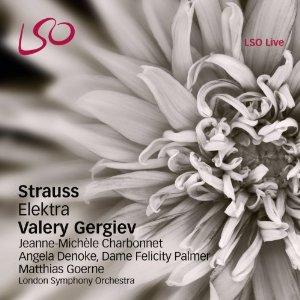Taken from live concert performances (and perhaps rehearsals) in London in January, 2010, this sonically impressive, note-complete Elektra is an odd duck. Conductor Valery Gergiev has opted, I believe, to stress the sad, lyrical aspects of the work over the extreme violence that you find, say, in the Solti or Jochum performances. But on the other hand, there’s plenty of noise at all times—sometimes enough to make the singers feel competitive and work too hard. In other words, I suspect that other than “making music”, Gergiev and his cast have not really thought through the work’s hideous philosophical implications. Furthermore, it lacks the non-stop arc that makes it as powerful as it can be: you feel that it was rehearsed scene by scene and therefore presented that way. And why hurry through Elektra’s triumphant death-dance? It is such terrible beauty that it should be accented to a point of stomping mania.
If Jeanne-Michèle Charbonnet in the title role were a better singer, perhaps I might not have noticed these other oddities, but she begins with an about-to-be out-of-control vibrato that calms down after a while but is replaced with a nasty edge. (She occasionally has to fight the orchestra.) She sings the text well and gives us a good enough portrait of this wonderful psychotic, but comparisons do not come out in her favor. Just on one hand we have Nilsson, Borkh, Varnay, Behrens, and Schluter who have more interesting instruments and can express the hideous sarcasm in Elektra’s words with more expression.
There’s nothing wrong with Angela Denoke’s Chrysothemis, and she plays the needy, “normal” one well, but again, you think of Leonie Rysanek in the role (available on CDs), or Karita Mattila, who sang the part with such urgency that she almost overshadowed her Elektra years ago at Covent Garden. Felicity Palmer’s Klytemnestra needs no apologies. She manages the ugly vocal line handsomely and combines sniveling and cruelty in an expert manner.
Matthias Goerne is a wonderful singer and he imbues Orest’s lines with deep, dark meaning. He may be a bit understated, particularly in this company, but the lyrical moments are warm and touching. Ian Storey does not shout Aegisth’s music—a nice surprise indeed, and the handmaidens, etc, are disciplined and nasty. The LSO plays magnificently and there is no doubt that this Elektra is exciting. But it does not hold together as horror-drama and its effects are more visceral than anything else. It certainly isn’t shameful, but the competition, as noted, is too strong to place this anywhere near the top of the list. And the recording producers’ decision to have the music fade out at the end of Disc 1 and fade in at the start of the next is simply awful. Stick with Nilsson/Solti or, if sonics are not as crucial to you, the newly-released Schluter/Jochum from 1944. Or Behrens/Ozawa is a stunner as well.
































